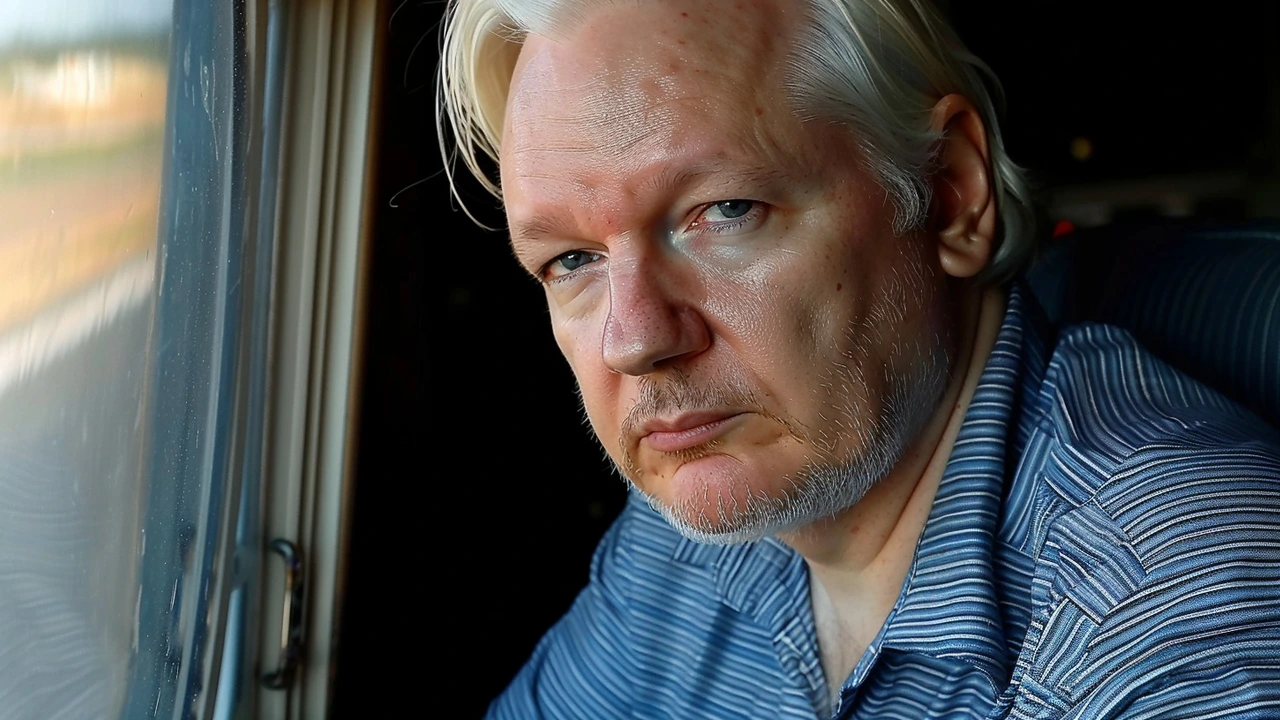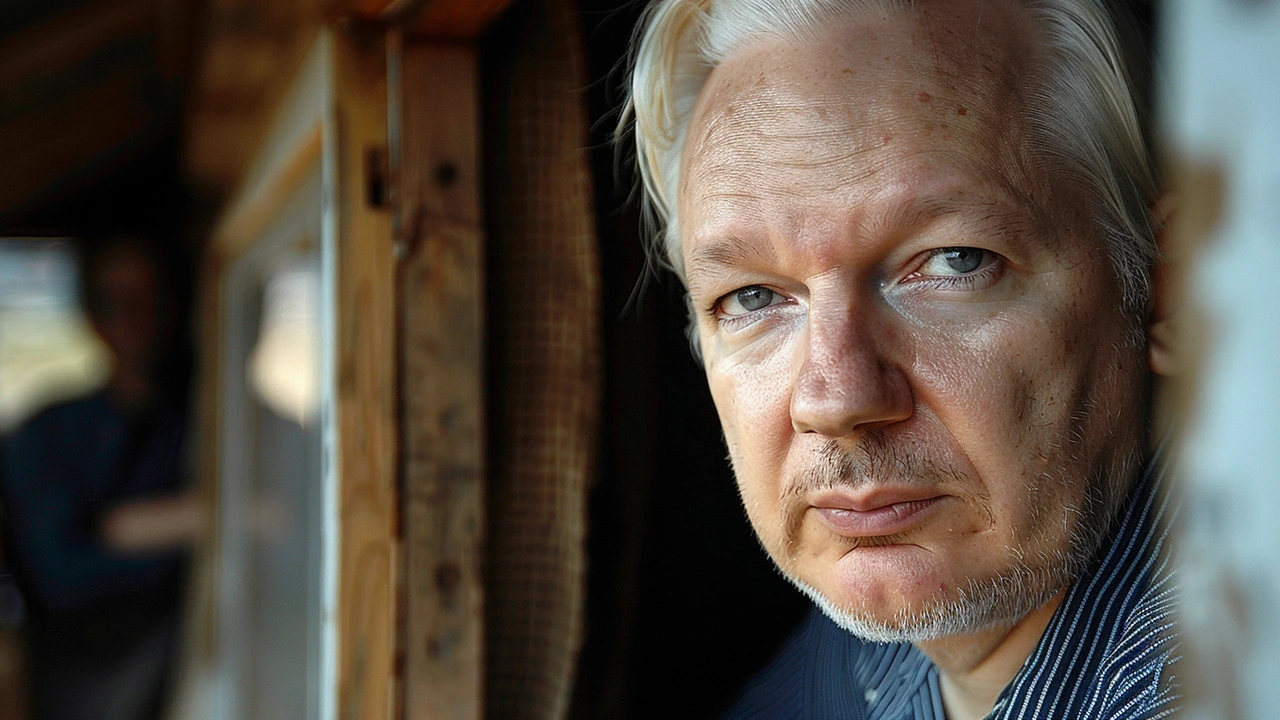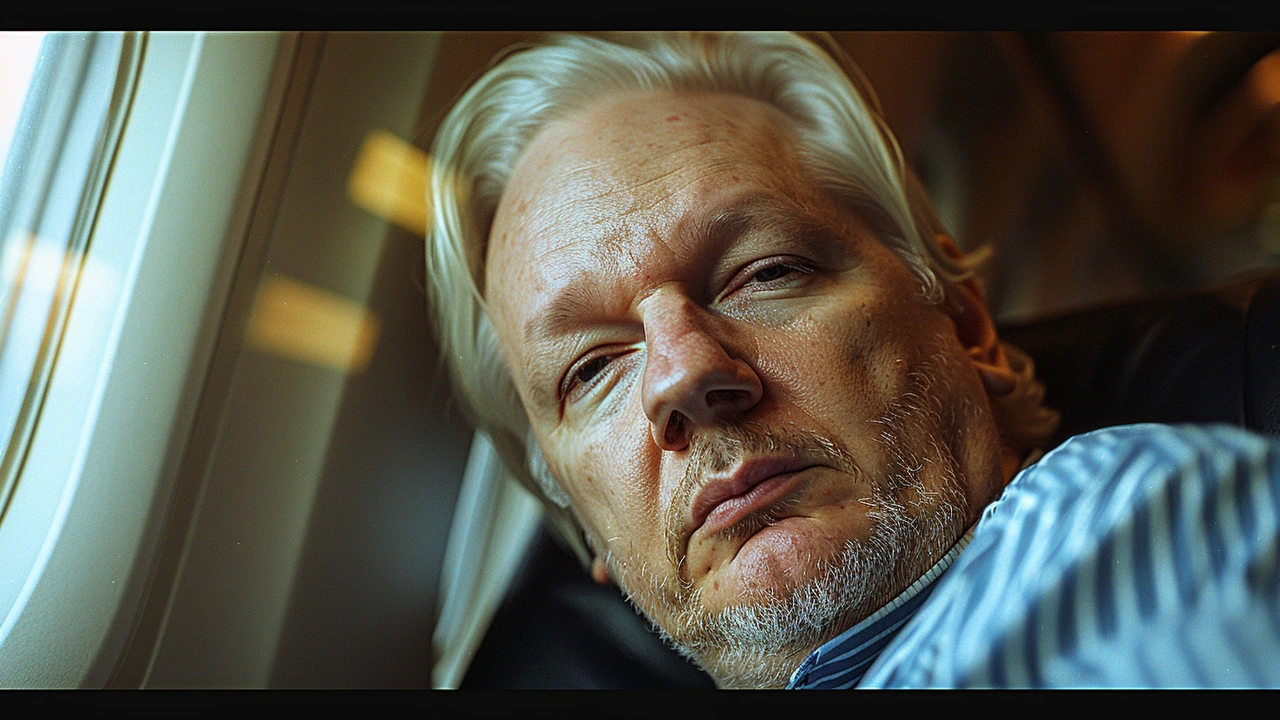Julian Assange's Plea Deal Marks the End of a Decade-Long Legal Drama

Julian Assange, the contentious founder of WikiLeaks, has finally left the United Kingdom for the Northern Mariana Islands. This significant move comes after his release from Belmarsh prison, marking the conclusion of a convoluted and prolonged legal saga. Assange’s legal battles have been a source of international intrigue since he sought asylum at the Ecuadorian embassy in London back in 2012.
In an endeavor to avoid extradition to Sweden over allegations of sexual misconduct, Assange spent seven years tucked away in the embassy. Although those Swedish charges were eventually dropped, his predicament was far from resolved. The United States, perceiving a different threat from Assange’s activities with WikiLeaks, pursued him on charges of espionage. His time at the embassy ended abruptly in April 2019 after Ecuador revoked his asylum status, leading to his immediate arrest by British authorities.
The Plea Deal and Its Impact
Now, as part of a plea deal, Assange has agreed to plead guilty to a single espionage charge in the United States. This deal not only facilitates his departure from the UK but also sets the stage for his eventual return to Australia. The agreement signifies a pivotal turn in a case that has lingered for over a decade, influencing international relations and sparking intense debates on press freedom, governmental transparency, and national security.
The implications of Assange’s plea deal extend beyond his personal fate. For the United States, the deal represents a compromise, ensuring that some form of accountability is met while avoiding the protracted legal battles that could have ensued. For the United Kingdom, Assange’s departure alleviates a diplomatic strain that has involved balancing relationships with the U.S., Sweden, and Ecuador. Australia, Assange’s home country, now faces the task of reintegrating a polarizing figure known for his controversial methods of information disclosure.
The Man Behind WikiLeaks
Assange’s journey began earnestly in 2010 with the publication of classified military documents and diplomatic cables via WikiLeaks. The platform, seen by some as a beacon of transparency and by others as a threat to national security, propelled Assange and his organization to the forefront of global news. The leaks exposed truths that many governments would prefer to keep hidden, leading to mixed perceptions of Assange as either a hero of free speech or a reckless insurrectionist.
The initial charges brought against Assange by Sweden in connection to sexual misconduct were the first of many legal quandaries he would face. These charges, although later dropped, left a lasting impact on his reputation and complicated his legal situation. Seeking refuge in the Ecuadorian embassy was a move that showcased both his desperation and determination to avoid extradition. It was a bold and unprecedented step, highlighting the lengths to which Assange was willing to go to protect himself and his cause.

A Legal and Diplomatic Tightrope
Assange’s asylum in the Ecuadorian embassy created a diplomatic conundrum. While inside the embassy, he was technically outside British jurisdiction but also not free to leave without facing immediate arrest. The British government found itself in a delicate position, having to honor international law and respect Ecuador’s sovereignty while maintaining its own legal integrity. This precarious situation continued until 2019 when Ecuador's patience wore thin, and Assange was expelled from the embassy. His subsequent arrest was swift and highly publicized, leading to renewed debates on international law and human rights.
The plea deal that has now come to fruition might seem like a conclusion, but it’s yet another chapter in the ongoing discussion about whistleblowers, governmental transparency, and the extent to which individuals and organizations should go to uncover the truth. While some view this deal as a reasonable compromise, others see it as a concession that undermines the fight for free speech.
Political Landscape and Governance
The longer Assange's case dragged on, the more it highlighted the need for robust governance and effective strategic policymaking to address such complex international issues. The UK government, amidst navigating Brexit implications and dealing with pressing domestic matters such as public finances and social care, had to delicately balance international diplomatic pressures. Fiscal responsibility and social care are areas that require detailed planning and substantial budgets, leaving less room for maneuvering on contentious international issues like Assange's case.
The evolving political landscape in Britain further showcases the importance of strategic governance. As the country works to re-establish its global position post-Brexit, handling high-profile cases with international implications becomes ever more challenging. The resolution of Assange's situation arguably allows for a redirection of focus towards more pressing matters within the UK’s domestic agenda, without the overshadowing influence of such a high-profile international case.

Concluding the Saga
As Assange settles in the Northern Mariana Islands, a sense of finality to his decade-long ordeal seems within reach. His eventual return to Australia remains a topic of interest, and what he chooses to do next might yet again influence international discourse on issues close to his heart. With the plea deal in place, the global attention that Assange garnered over the years may begin to wane, but the debates he sparked about government transparency and national security endure.
Ultimately, Julian Assange's departure from the UK and the plea deal that facilitated it closes a significant chapter in international legal history. The story of WikiLeaks, its founder, and the international response to both, serves as a testament to the complex interplay between political, legal, and ethical considerations in modern governance. Assange’s legacy, controversial and profound, will continue to inspire discussions around the world for years to come.
From a legal‑tech perspective, the DOJ's decision to offer a single‑count espionage plea is a textbook example of risk‑mitigation in high‑profile cases. By narrowing the charge, they sidestep a protracted trial that could expose classified methodologies. This move also preserves the procedural veneer of accountability without destabilizing the precedent for future whistleblower prosecutions. Moreover, the logistical coordination with the UK and Australian authorities underscores the multilateral diplomacy that often underpins such settlements. In short, the deal is as much about geopolitical calculus as it is about criminal justice.
The plea agreement eliminates the need for a potentially hazardous evidentiary showdown, thereby conserving judicial resources. However, it also raises concerns about the proportionality of a single espionage conviction given the multifaceted nature of the alleged offenses.
i cant beleive he finally got a plea deal lol
While the resolution may appear expedient, the formalities of due process warrant a measured appraisal. The United Kingdom's role, albeit peripheral, demonstrates an adherence to rule‑of‑law principles amidst diplomatic pressures. It would be remiss to overlook the broader implications for press freedom, especially when legislative bodies contemplate further restrictions. Accordingly, the discourse should remain anchored in constitutional safeguards rather than transient political expediencies.
The narrative conveniently sidesteps the underlying issue: state overreach. A single charge cannot encapsulate the systemic abuse of surveillance powers.
Honestly, this whole saga has been a rollercoaster for the global community. It's a reminder that legal outcomes are rarely isolated from the geopolitical stage. I hope the focus now shifts toward constructive reforms rather than celebratory headlines. Keep an eye on how Australia integrates him back into society.
One could argue that the plea deal is merely a superficial patch on a deeper institutional flaw. If we accept this settlement without critique, we risk normalizing covert data extraction. The legal community should interrogate whether espionage statutes are being wielded as tools of political suppression. Moreover, the optics of a “one‑count” resolution may mask the broader spectrum of alleged misconduct.
Let’s be clear: the public discourse has been hijacked by sensationalism, obscuring the factual matrix of the case. A comprehensive analysis reveals that the evidentiary base for multiple charges was thin, which justifies the narrow plea. Nonetheless, the narrative of hero versus villain persists, perpetuating a binary that hinders nuanced policy development.
Behold, the curtain falls on a decade‑long theater of intrigue, where every act was staged upon the fragile scaffolding of international law. The protagonist, once vilified as a rogue operative, now steps into the shadows of a plea, his saga etched into the annals of contemporary jurisprudence. Yet, let us not be deceived by the seeming finality; the reverberations of this accord will echo through corridors of power, shaping policy long after the headlines dim. The United States, in its strategic calculus, chose a deal that minimizes collateral damage while preserving a veneer of justice. Britain, ever the stagehand, facilitated the exit, balancing diplomatic decorum with domestic scrutiny. Australia, the silent observer, now confronts the task of reintegrating a figure whose legacy is both lauded and condemned. In academia, scholars will dissect this episode, debating the ethics of whistleblowing versus national security. Journalists will revisit the leaked documents, reassessing their impact on public discourse. Legal analysts will scrutinize the precedent set by a single‑count conviction, questioning its sufficiency in deterring future disclosures. Civil liberties advocates will warn of the chilling effect such settlements may engender, urging vigilance. Conversely, security agencies will hail the resolution as a triumph of measured restraint. The media, ever hungry for narrative, will spin tales of redemption or betrayal, depending on the ideological lens. Behind the scenes, the bureaucrats who negotiated the terms will remain anonymous, their contributions uncelebrated. The Northern Mariana Islands, now a waypoint in this odyssey, will host a man whose name has become synonymous with the struggle between transparency and secrecy. As the world watches, the true measure of this plea will be judged not by courtroom filings, but by the policies it inspires. Will governments recalibrate surveillance statutes? Will the public demand greater accountability? Only time will reveal whether this chapter is a conclusion or merely a prelude to further debate.
In the grand tapestry of dissent, each thread-no matter how tangled-contributes to the broader pattern of truth.